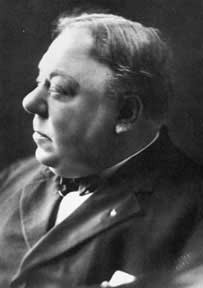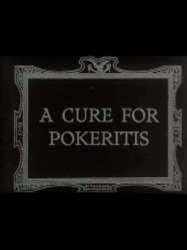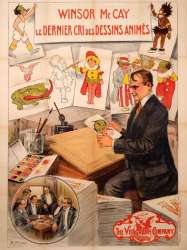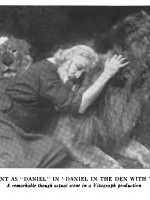John Bunny is a Actor American born on 20 september 1863 at New York City (USA)

John Bunny (September 21, 1863 – April 26, 1915) was an American actor and was one of the first comic stars of the motion picture era. Between 1910 and his death in 1915 Bunny was one of the top stars of early silent film, as well as an early example of celebrity. At one time he was billed as "the man who makes more than the president". His face was insured for $100,000 and his unexpected death made headlines around the world. Though quickly forgotten, Bunny paved the way for future plump comedians such as Fatty Arbuckle and Jackie Gleason.
Born in New York City, Bunny was raised in Brooklyn where he attended high school and worked as a grocery clerk before joining a small minstrel show touring the East Coast. He went on to jobs as stage manager for various stock companies and performed in vaudeville before being drawn to the fledgling motion picture business. By 1910, Bunny was working at Vitagraph Studios where the happy-go-lucky, rotund man quickly became an international star of silent film comedies. At Vitagraph he starred in a series of over one hundred popular comedies with the comedian Flora Finch that were popularly called "Bunnyfinches".
The popularity of Bunny can be attributed to the succulent fun of the music hall and the circus, not the dry wit of sophisticated comedies. He was jolly, boisterous, and broad in his acting, and because of this style, he connected strongly with early nickelodeon audiences.
In a 1913 interview in Motion Picture Acting by Francis Agnew, he prophetically mused, "I believe the time is coming when motion picture machines will be a part of the equipment of every school and college in the country, and many branches of learning now so objectionable to children will be made interesting by the use of motion pictures. My principal worry is the fact that I can’t hope to live long enough to do all the work that I’ve mapped out for myself. I have planned fifty years of activity in the motion picture business, which I fear I will not live to carry out entirely. I want to see Latin and Greek mythology taught in every school and college in the United States by the use of films. It can and will be done and will be one of the biggest gifts to mankind the world has ever known."
Regarding the motion picture industry as a profession, Bunny reflected to Francis Agnew, "There’s nothing like it. No other work gives an actor or would-be actor the same advantages. In the pictures, a player gets fifty-two weeks in the year. Where is the theatrical manager who can offer that? Not even vaudeville stars can get such bookings. At best, thirty weeks is about all an actor can expect on the stage. He may get summer stock work, but even so it is of uncertain duration. Stage work is a gamble. Even when you have been engaged for a production, rehearsed from three to six weeks without pay, and no doubt bought your own costumes for the piece, you have no guarantee that it will be a success. If the public does not set its stamp of approval, your job is all over perhaps after but one performance, and you can only repeat the procedure by trying again with someone else, charging the other to your loss account, with a credit notation probably on the page marked ‘experience.’"
Unfortunately, Bunny was strongly disliked by most of his fellow actors at Vitagraph, including Finch. Interviews of former Vitagraph personnel conducted by Anthony Slide in the 1960s and 1970s revealed that his co-workers found him arrogant, bad-tempered, and difficult to work with, an image very much at odds with his genial on-screen persona.
Personal life
Bunny married Clara Scallan on January 23, 1890 with whom he had two children, George and John, Jr. who later became an actor. His brother George also became an actor.
John Bunny never drank or smoked. His so-called Rum Nose was not from drinking according to Moe Howard.
Death
Bunny had been acting in films for only five years when he died from Bright's disease at his home in New Rochelle on April 26, 1915. He was interred in the Cemetery of the Evergreens in Brooklyn, New York. Because silent film had no language barrier, Bunny's popularity was such that his death was front-page news in Europe as well as the United States.
Source : Wikidata
John Bunny

Nationality USA
Birth 20 september 1863 at New York City (USA)
Death 26 april 1915 (at 51 years) at Brooklyn (USA)
Birth 20 september 1863 at New York City (USA)
Death 26 april 1915 (at 51 years) at Brooklyn (USA)
Biography
Early life and careerBorn in New York City, Bunny was raised in Brooklyn where he attended high school and worked as a grocery clerk before joining a small minstrel show touring the East Coast. He went on to jobs as stage manager for various stock companies and performed in vaudeville before being drawn to the fledgling motion picture business. By 1910, Bunny was working at Vitagraph Studios where the happy-go-lucky, rotund man quickly became an international star of silent film comedies. At Vitagraph he starred in a series of over one hundred popular comedies with the comedian Flora Finch that were popularly called "Bunnyfinches".
The popularity of Bunny can be attributed to the succulent fun of the music hall and the circus, not the dry wit of sophisticated comedies. He was jolly, boisterous, and broad in his acting, and because of this style, he connected strongly with early nickelodeon audiences.
In a 1913 interview in Motion Picture Acting by Francis Agnew, he prophetically mused, "I believe the time is coming when motion picture machines will be a part of the equipment of every school and college in the country, and many branches of learning now so objectionable to children will be made interesting by the use of motion pictures. My principal worry is the fact that I can’t hope to live long enough to do all the work that I’ve mapped out for myself. I have planned fifty years of activity in the motion picture business, which I fear I will not live to carry out entirely. I want to see Latin and Greek mythology taught in every school and college in the United States by the use of films. It can and will be done and will be one of the biggest gifts to mankind the world has ever known."
Regarding the motion picture industry as a profession, Bunny reflected to Francis Agnew, "There’s nothing like it. No other work gives an actor or would-be actor the same advantages. In the pictures, a player gets fifty-two weeks in the year. Where is the theatrical manager who can offer that? Not even vaudeville stars can get such bookings. At best, thirty weeks is about all an actor can expect on the stage. He may get summer stock work, but even so it is of uncertain duration. Stage work is a gamble. Even when you have been engaged for a production, rehearsed from three to six weeks without pay, and no doubt bought your own costumes for the piece, you have no guarantee that it will be a success. If the public does not set its stamp of approval, your job is all over perhaps after but one performance, and you can only repeat the procedure by trying again with someone else, charging the other to your loss account, with a credit notation probably on the page marked ‘experience.’"
Unfortunately, Bunny was strongly disliked by most of his fellow actors at Vitagraph, including Finch. Interviews of former Vitagraph personnel conducted by Anthony Slide in the 1960s and 1970s revealed that his co-workers found him arrogant, bad-tempered, and difficult to work with, an image very much at odds with his genial on-screen persona.
Personal life
Bunny married Clara Scallan on January 23, 1890 with whom he had two children, George and John, Jr. who later became an actor. His brother George also became an actor.
John Bunny never drank or smoked. His so-called Rum Nose was not from drinking according to Moe Howard.
Death
Bunny had been acting in films for only five years when he died from Bright's disease at his home in New Rochelle on April 26, 1915. He was interred in the Cemetery of the Evergreens in Brooklyn, New York. Because silent film had no language barrier, Bunny's popularity was such that his death was front-page news in Europe as well as the United States.
Usually with
Filmography of John Bunny (12 films)
Actor

Moon Over Harlem (1939)
, 1h9Directed by Edgar George Ulmer
Origin USA
Genres Drama, Musical, Crime, Romance
Themes Musical films
Actors Mercedes Gilbert, John Bunny, John Fortune, Mary Young, Frank Wilson
Roles Wallstreet
Rating48%






Gertie the Dinosaur (1914)
, 12minutesDirected by Winsor McCay
Origin USA
Genres Comedy, Animation
Themes Films about animals, Dinosaur films, La préhistoire, Animaux préhistoriques
Actors Winsor McCay, Max Fleischer, Tom Powers, John Bunny
Roles Club Member
Rating70%





When her master McCay calls her, the frisky, childlike Gertie appears from a cave. Her whip-wielding master has her do tricks such as raising her foot or bowing on command. When she feels she has been pushed too far, she nips back at her master. She cries when he scolds her, and he placates her with a pumpkin. Throughout the act, prehistoric denizens such as a flying lizard continually distract Gertie. She tosses a mammoth in the lake; when it teases her by spraying her with water, she hurls a boulder at it as it swims away. After she quenches her thirst by draining the lake, McCay has her carry him offstage while he bows to the audience.
 , 15minutes
, 15minutesDirected by Laurence Trimble
Origin USA
Genres Comedy
Actors John Bunny
Roles Samuel Pickwick
Rating57%






Bunny as a Reporter (1913)
Directed by Wilfrid North
Origin USA
Actors John Bunny, Flora Finch
Bunny, an amateur reporter, wants to impress the editor of a small-town newspaper, so he disguises himself as a woman and infiltrates a secret suffragette meeting.

Bunny and the Bunny Hug (1913)
Directed by Wilfrid North
Origin USA
Genres Comedy
Actors John Bunny, Earle Williams, Leah Baird, Ned Finley, Leo Delaney, Lillian Hayward
A poor but gregarious Irish nightwatchman is falsely introduced as a count at a society ball. He proved to be very popular, especially with the ladies. In one sequence, Bunny performs a (at the time) new and popular dance, the Bunny Hug.

A Cure for Pokeritis (1912)
, 13minutesDirected by Laurence Trimble
Origin USA
Genres Comedy
Themes Jeu, Poker
Actors John Bunny, Flora Finch, Leah Baird, Charles Eldridge, Arthur Rosson, James W. Morrison
Roles Mr. Sharpe
Rating51%





Upon returning home from an evening spent losing at poker, George Brown swears off gambling forever. However, his friend Bigelow convinces him to secretly continue attending the weekly poker game and to tell his wife Mary that he has been admitted to the Sons of the Morning, a fraternal lodge, to explain his absences. When George talks in his sleep, she becomes suspicious and has her cousin Freddie Dewdrop follow him, allowing her to learn the truth. Together with the wives of the other poker players, she enacts a plan to end the gambling. Freddie and the members of his Bible study group dress up as police officers and raid the game. The gamblers' wives then arrive, and the police leave the men to be scolded, purportedly in place of being arrested. As the film ends, the Browns reconcile.

Captain Jenks' Dilemma (1912)
Origin USA
Genres Comedy
Actors John Bunny, Julia Swayne Gordon, Charles Eldridge, Dolores Costello, Helene Costello
Roles Captain Jenks

Her Crowning Glory (1911)
, 14minutesDirected by Laurence Trimble, Frank Capra
Origin USA
Genres Drama, Comedy, Fantasy
Actors John Bunny, Helene Costello, Mae Costello, Flora Finch, Kate Price
Roles Mortimer Bunny
Rating56%






A Tale of Two Cities (1911)
, 30minutesDirected by William Humphrey
Origin USA
Genres Drama, Historical
Themes Political films, Films about capital punishment, French Revolution films
Actors Maurice Costello, Florence Turner, John Bunny, Norma Talmadge, William Humphrey, Ralph Ince
Roles Jailer
Rating54%






Little Nemo (1911)
Directed by Winsor McCay, James Stuart Blackton
Origin USA
Genres Comedy, Animation
Actors John Bunny, Winsor McCay, Maurice Costello, Moe Howard
Roles Himself
Rating70%





Following credits proclaiming McCay as "The Famous Cartoonist of the New York Herald" and "the first artist to attempt drawing pictures that will move", McCay sits in a restaurant with a group of colleagues, cartoonist George McManus, actor John Bunny and publisher Eugene V. Brewster among them. McCay bets the group that in one month he can make 4,000 drawings move. The group laughs and gestures that he is drunk or crazy. McCay sets to work in a studio where he directs workers to move around bundles of paper and barrels of ink. A month later, McCay gathers his colleagues in front of a film projector. McCay rapidly sketches characters from the cast of his Little Nemo comic strip.

Vanity Fair (1911)
Directed by Charles Kent
Origin USA
Genres Drama
Actors Helen Gardner, William V. Ranous, John Bunny, Harry Northrup, Alec B. Francis, Leo Delaney
Roles Joseph Sedley
Rating58%





 Connection
Connection




